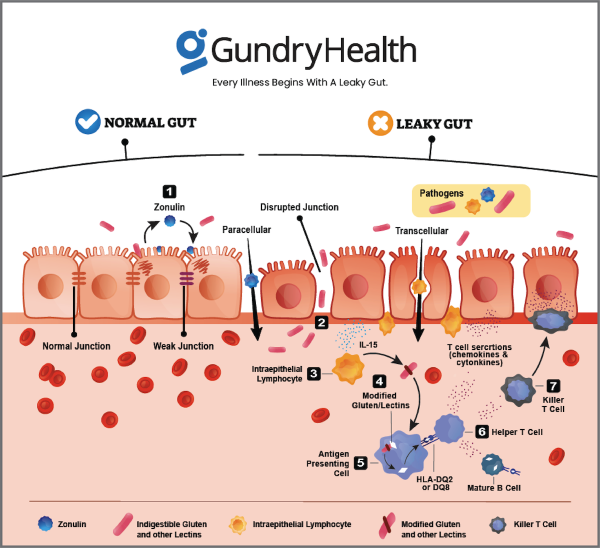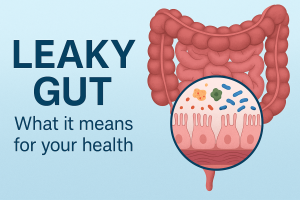Endometriosis: How This Autoimmune Disease Is Linked to Leaky Gut
Endometriosis is a painful and debilitating condition that affects millions of women around the world. It occurs when the tissue that normally lines the inside of the uterus grows outside of it, forming lesions or cysts on the ovaries, fallopian tubes, or other organs. These lesions can cause inflammation, scarring, and adhesions, leading to severe menstrual cramps, chronic pelvic pain, infertility, and other complications.
But endometriosis is not just a problem of the reproductive system. It’s also an autoimmune disease that can affect your whole body and your overall health.
Understanding Endometriosis as an Autoimmune Disease
Endometriosis has been around for centuries, but it is only recently that its true impact on women’s health has been recognized. In the past, endometriosis was believed to be a condition of the reproductive system, affecting only the uterus and ovaries. However, as research has progressed, it has become clear that endometriosis is much more than that. It’s an autoimmune disease that can impact nearly every aspect of a woman’s life. Understanding the link between endometriosis and autoimmune disease is key to finding effective treatment options and ultimately improving women’s health.
To understand autoimmune diseases we have to learn about a condition called leaky gut and how this condition is at the root of most autoimmune diseases.
What Is Leaky Gut Syndrome and How Does It Cause Autoimmune Diseases?
Leaky gut syndrome is a condition where your intestinal lining becomes damaged and porous, allowing undigested food particles, toxins, bacteria, and other harmful substances to leak into your bloodstream. This triggers an immune reaction, as your body tries to fight off these foreign invaders. However, this also causes chronic inflammation, which can damage your tissues and organs over time.
Leaky gut syndrome is at the root of most autoimmune diseases, such as rheumatoid arthritis, lupus, multiple sclerosis, psoriasis, and of course, endometriosis. Autoimmune diseases are conditions where your immune system mistakenly attacks your own cells and tissues, causing various symptoms and complications. The reason why this happens is because of molecular mimicry: some of the substances that leak from your gut resemble your own tissues, so your immune system gets confused and attacks both.
For example, gluten is a protein found in wheat and other grains that can cause leaky gut syndrome in some people. Gluten also resembles a protein found in your thyroid gland, so when gluten leaks into your bloodstream, your immune system may attack your thyroid as well. This can lead to hypothyroidism or Hashimoto’s disease, which are common in women with endometriosis.
How Does Endometriosis Cause or Worsen Leaky Gut Syndrome?
Endometriosis can cause or worsen leaky gut syndrome in several ways. First of all, endometriosis itself causes inflammation in your pelvic cavity, which can spread to your intestines and damage your gut lining. Secondly, endometriosis can interfere with your hormonal balance, which can affect your gut health as well. For instance, estrogen dominance (having too much estrogen relative to progesterone) can increase intestinal permeability and promote the growth of bad bacteria in your gut.
Thirdly, endometriosis can affect your diet and lifestyle choices, which can also impact your gut health. For example, many women with endometriosis experience pain during or after eating certain foods, such as dairy products, soy products, red meat, sugar, caffeine, alcohol, or spicy foods. These foods can also cause or worsen leaky gut syndrome by irritating your gut lining or feeding the bad bacteria in your gut.
Furthermore, many women with endometriosis resort to medications or surgeries to manage their symptoms or improve their fertility. However, these treatments can also have negative effects on your gut health. For example,
- Nonsteroidal anti-inflammatory drugs (NSAIDs), such as ibuprofen or naproxen, can reduce inflammation and pain in the short term but can also damage your gut lining and increase intestinal permeability in the long term.
- Hormonal contraceptives or hormone replacement therapy (HRT), such as birth control pills or patches, can regulate your menstrual cycle and reduce endometrial growth but can also disrupt your natural hormonal balance and alter your gut microbiome (the community of beneficial bacteria in your gut).
- Antibiotics or steroids can kill off infections or suppress inflammation but can also wipe out the good bacteria in your gut and create an imbalance in your gut microbiome.
- Surgeries such as laparoscopy or hysterectomy can remove endometrial lesions or organs but can also cause trauma to your intestines or introduce infections into your abdominal cavity.
How To Diagnose and Treat Endometriosis and Leaky Gut Syndrome?
Recent research has found that endometriosis is more than just a reproductive issue. Studies have shown that women with endometriosis are at a higher risk for developing other autoimmune conditions, such as rheumatoid arthritis and lupus. Additionally, endometriosis has been linked to systemic inflammation, which can contribute to a range of chronic health issues.
Endometriosis and leaky gut syndrome can be difficult to diagnose, as they can cause a variety of symptoms that can be mistaken for other conditions. To make a diagnosis, your doctor will need to take a detailed medical history, perform a physical examination, and order some tests to confirm your condition. These tests may include:
- Blood tests to check for inflammation, hormones, antibodies, or infections
- Urine tests to check for toxins or infections
- Stool tests to check for parasites, bacteria, or yeast
- Breath tests to check for bacterial overgrowth or food intolerances
- Ultrasound or MRI scans to check for endometrial lesions or cysts
- Laparoscopy or biopsy to check for endometrial tissue outside the uterus
The treatment of endometriosis and leaky gut syndrome depends on the severity and cause of your condition. Some of the possible treatments include:
- Medications or supplements to reduce inflammation, regulate hormones, balance gut bacteria, or heal the gut lining
- Dietary changes to eliminate foods that cause leaky gut syndrome or endometriosis symptoms and to include foods that support gut health and hormonal balance
- Lifestyle changes to reduce stress, improve sleep, exercise moderately, and avoid toxins or infections
- Alternative therapies such as acupuncture, massage, yoga, meditation, or herbal remedies to relieve pain, inflammation, or stress
- Surgery to remove endometrial lesions or organs if medications or other treatments fail or if fertility is desired
How To Prevent or Heal Endometriosis and Leaky Gut Syndrome with Diet and Lifestyle Changes?
Despite the growing evidence linking endometriosis and autoimmune disease, many doctors still treat endometriosis as solely a reproductive issue and may not consider its wider impact on a patient’s health. This can lead to misdiagnosis or inadequate treatment. It’s crucial for patients and their loved ones to advocate for comprehensive and individualized care that takes into account the potential impact of endometriosis on other areas of health.
Fortunately, there are treatment options available. Managing inflammation through diet and lifestyle changes can be an effective way to reduce symptoms in patients with endometriosis and other autoimmune diseases. Additionally, certain medications and hormonal treatments can help manage symptoms and reduce overall inflammation in the body.
While some forms of endometriosis and leaky gut syndrome are not preventable, you can still take steps to improve your overall health and reduce your risk of complications. Some of the best ways to do so are:
- Eat a balanced diet that is rich in plant-based foods, healthy fats, and lean proteins. Avoid foods that are high in sugar, refined carbs, lectins, gluten, dairy, soy, corn, and nightshades. These foods can trigger inflammation, disrupt your gut microbiome, and impair your immune system.
- Drink plenty of water and stay hydrated throughout the day. Dehydration can worsen your symptoms and affect your blood volume and pressure.
- Avoid alcohol, caffeine, nicotine, and drugs that can interfere with your gut function. These substances can cause dehydration, increase your heart rate and blood pressure, and affect your mood and sleep quality.
- Manage your stress levels and practice relaxation techniques. Stress can activate your sympathetic nervous system (the fight-or-flight response) and cause a surge of adrenaline and cortisol. This can exacerbate your symptoms and damage your nerves over time.
- Get enough sleep and follow a regular sleep schedule. Sleep is essential for repairing your body and regulating your hormones. Lack of sleep can impair your cognitive function, mood, metabolism, and immune system.
- Exercise moderately and regularly but avoid overexertion or extreme temperatures. Exercise can improve your cardiovascular health, muscle tone, blood flow, and mood. However, too much exercise or exposure to heat or cold can trigger your symptoms and cause a drop or spike in your blood pressure or heart rate.
Endometriosis is more than just a reproductive issue – it’s an autoimmune disease that can impact a woman’s overall health. Understanding the link between endometriosis and autoimmune disease is crucial for finding effective treatment options that address the full scope of a patient’s health. By advocating for comprehensive and individualized care, patients with endometriosis can take control of their health and improve their overall well-being.
Get personalized care and recommendations for Endometriosis from Dr Gundry-Approved program
If you’re looking for more guidance about Endometriosis disease than this short list of recommendations, Dr. Gundry’s unique health program is now available to you (without needing an appointment at one of Dr. Gundry’s two, waitlist-only West Coast clinics).
Thanks to the pioneering work of Dr. Gundry and his team at Gundry Health, patient care team trained in Dr. Gundry’s unique holistic methods are now available to help you craft your own personalized Endometriosis program.
It’s easy to get started.
Simply click the link below to get more information about personalized Endometriosis treatment plan options, so you can get expert analysis, diagnostic care, and a plan for tackling lupus, arthritis, or other autoimmune diseases.
Each patient care team member at Gundry Health is Board Certified and trained in Dr. Gundry’s renowned approach to functional medicine and care.
Get your personal lab data and talk to a U.S. licensed doctor. Click Here.







